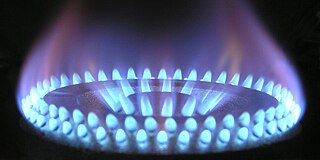
Natural gas is a naturally occurring mixture of gaseous hydrocarbons consisting primarily of methane (95%) in addition to various smaller amounts of other higher alkanes. Traces of carbon dioxide, nitrogen, hydrogen sulfide, and helium are also usually present. Methane is colorless and odorless, and the second largest greenhouse gas contributor to global climate change after carbon dioxide. Because natural gas is odorless, odorizers such as mercaptan are commonly added to it for safety so that leaks can be readily detected.

PJSC Gazprom is a Russian majority state-owned multinational energy corporation headquartered in the Lakhta Center in Saint Petersburg. The Gazprom name is a contraction of the Russian words gazovaya promyshlennost. In January 2022, Gazprom displaced Sberbank from the first place in the list of the largest company in Russia by market capitalization. In 2022, the company's revenue amounted to 8 trillion rubles.

Liquefied natural gas (LNG) is natural gas (predominantly methane, CH4, with some mixture of ethane, C2H6) that has been cooled down to liquid form for ease and safety of non-pressurized storage or transport. It takes up about 1/600th the volume of natural gas in the gaseous state at standard conditions for temperature and pressure.
Centrica plc is a British multinational energy and services company with its headquarters in Windsor, Berkshire. Its principal activity is the supply of electricity and gas to consumers in the United Kingdom and Ireland.

The Office of Gas and Electricity Markets (Ofgem), supporting the Gas and Electricity Markets Authority, is the government regulator for the electricity and downstream natural gas markets in Great Britain. It was formed by the merger of the Office of Electricity Regulation (OFFER) and Office of Gas Supply (Ofgas).

Japan is a major consumer of energy, ranking fifth in the world by primary energy use. Fossil fuels accounted for 88% of Japan's primary energy in 2019. Japan imports most of its energy due to scarce domestic resources. As of 2022, the country imports 97% of its oil and is the largest liquefied natural gas (LNG) importer globally.

Polskie Górnictwo Naftowe i Gazownictwo S.A., abbreviated to PGNiG, was a Polish state-controlled oil and gas company, headquartered in Warsaw, Poland. The company has branches and representative offices in Russia, Pakistan, Belarus and Ukraine and holds equity interests in some 30 subsidiaries, including providers of specialist geophysical, drilling and well services.

The Yamal–Europe natural gas pipeline is a 4,107-kilometre-long (2,552 mi) pipeline connecting Russian natural gas fields in the Yamal Peninsula and Western Siberia with Poland and Germany, through Belarus. The Poland portion ceased operating in 2022.
An energy superpower is a country that supplies large amounts of energy resources to a significant number of other countries - and therefore has the potential to influence world markets for political or economic gains. Energy superpower status might be exercised, for example, by significantly influencing the price on global markets or by withholding supplies. Nowadays, the term "energy superpower" is increasingly used to characterize nations at the forefront of energy transition and the development of renewable energy resources.

QatarEnergy, formerly Qatar Petroleum (QP), is a state owned petroleum company of Qatar. The company operates all oil and gas activities in Qatar, including exploration, production, refining, transport, and storage. The President & CEO is Saad Sherida al-Kaabi, Minister of State for Energy Affairs. The company's operations are directly linked with state planning agencies, regulatory authorities, and policy making bodies. Together, revenues from oil and natural gas amount to 60% of the country's GDP. As of 2018 it was the third largest oil company in the world by oil and gas reserves. In 2022, the company had total revenues of US$52bn, a net income of US42.4bn, and total assets of US$162bn. In 2021, QatarEnergy was the fifth largest gas company in the world.

Russia supplies a significant volume of fossil fuels to other European countries. In 2021, it was the largest exporter of oil and natural gas to the European Union, (90%) and 40% of gas consumed in the EU came from Russia.

OVO Energy is a major energy supplier based in Bristol, England.
Bangladesh suffers with heavy energy crisis with the gradual expansion of economic activities of the country. The estimations and reserves of energy resources show future potentials but a small fraction of them are being utilized which proved to be insufficient. Moreover, the impact of climate change and environment pollution has also been significantly felt. As a result, the successive governments have aimed at formulating an effective energy policy which would address these concerns. The energy policies have also received extensive criticisms especially on the questions of energy export and methods of extraction.

In 2021 Russia was the world's second-largest producer of natural gas, producing an estimated 701 billion cubic meters (bcm) of gas a year, and the world's largest natural gas exporter, shipping an estimated 250 bcm a year. In 2022 the export market was significantly downsized, following the Russian invasion of Ukraine and Russia reducing exports after countries refused to pay in rubles.

Natural gas supplies over a quarter of Turkey's energy. The country consumes 50 to 60 billion cubic metres of this natural gas each year, nearly all of which is imported. A large gas field in the Black Sea however started production in 2023.
Higher energy prices pushed families into poverty, forced some factories to curtail output or even shut down, and slowed economic growth. It was estimated in 2022 that an additional 11 million Europeans could be driven to poverty due to energy inflation. Europe's gas supply is uniquely vulnerable because of its historic reliance on Russia, while many emerging economies have seen higher energy import bills and fuel shortages.

The Russia–EU gas dispute flared up in March 2022 following the invasion of Ukraine on 24 February 2022. Russia and the major EU countries clashed over the issue of payment for natural gas pipelined to Europe by Russia's Gazprom, amidst sanctions on Russia that were expanded in response to Russia's 2022 invasion of Ukraine. In June, Gazprom claimed it was obliged to cut the flow of gas to Germany by more than half, as a result of such sanctions that prevented the Russian company from receiving its turbine component from Canada. On 26 September 2022, three of the four pipes of the Nord Stream 1 and 2 gas pipelines were sabotaged. This resulted in a record release of 115,000 tonnes of methane (CH4) – an equivalent of 15 million tonnes of carbon dioxide (CO2) – and is believed to have made a contribution to global warming.
Since late 2021, the prices for many essential goods in the United Kingdom began increasing faster than household incomes, resulting in a fall in real incomes. The phenomenon has been termed a cost-of-living crisis. This is caused in part by a rise in inflation in both the UK and the world in general, as well as the economic impact of issues such as the COVID-19 pandemic, Russia's invasion of Ukraine and Brexit. While all in the UK are affected by rising prices, it most substantially affects low-income persons. The British government has responded in various ways such as grants, tax rebates, and subsidies to electricity and gas suppliers.
The 2021–2022 global energy crisis has caused varying effects in different parts of the world.
As part of the sanctions imposed on the Russian Federation as a result of the Russo-Ukrainian War, on 3 December 2022, the European Union (EU) agreed to cap the price of natural gas in order to reduce the volatility created by Russia in the gas market.














